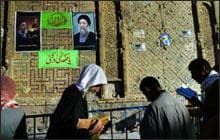Advertisement
Islamic Democracy
Resume
For six decades, American policy in the Middle East was pretty clear: go with the strongmen and never mind the democratic niceties. Stability was what mattered.
Four years ago, George W. Bush declared an end to all that. Stability cannot be bought at the expense of liberty, he declared. The USA, he said, would now line up with democracy.
But the angry, Islamic democracy that has surged in Bush's time is not what the president had in mind. Hamas, Hezbollah, the Muslim Brotherhood — these have the political popularity. Washington calls them extremists, terrorists. So, what now?
This hour On Point: Islamic democracy, and America's hard choices in the Middle East.
Quotes from the Show:
"We've had a series of setbacks for democracy across the Middle East, particularly in countries which are our longtime and continued allies such as Saudi Arabia, Egypt and Jordan." Ken Silverstein
"In this part of the world we frequently ask if the Islamic world is ready for democracy, and there's this suggestion that they're not just quite mature enough or ready for it when in fact we might be asking is whether the West is ready for Islamic democracy because for more than the past decade, there's been a real flowering of Islamic political parties across the Middle East." Ken Silverstein
"We need to distinguish between Al Qaeda and organizations like Hezbollah and Hamas who have a stake in the system. Right now we don't make that distinction." Ken Silverstein
"There is a very traditional Islamic opposition in Egypt. It's generations old. It represents a very significant constituency inside Egypt. I think what is remarkable is that maybe over the past few years in Cairo and the rest of the country is that you're starting to see cooperation between that Islamic opposition and the more secular opposition. That's a new development." Anthony Shadid
"I think it's pretty clear there is deep disenchantment with US policy at this point, not only in Egypt but Lebanon as well and elsewhere in the Middle East. We're dealing with a Middle East today that's very unsettled. It's a bleak moment in the Middle East right now and ... there's deep disillusionment out there about what United States had promised and now what it's trying to promote in the name of stability." Anthony Shadid
"It's difficult to see how you're going to lead to real democratic reform and real democratic change in these countries ... without some kind of engagement with Islamic movements since they represent such large constituencies but at this point you don't see any real signal from the Americans that they're willing to engage or have a desire to engage them. "
"Egyptians are very contemptuous of their own regime. They would like to have a freer political system, there's no question about that. By the same token, I think that if the Egyptians had the opportunity to vote freely, they wouldn't necessarily vote for the Muslim Brotherhood. One of the problems is that the regime's policy has made this group basically the only show in town." Augustus Richard Norton
"Many Lebanese would agree probably the only real political party in Lebanon [is Hezbollah]. What's happened is that you've had a migration of support among Lebanese Muslims, particularly the Shiaa Muslims, in the direction of supporting Hezbollah. ... They see this organization as a means by which they can basically play a better hand in politics." Augustus Richard Norton
Guests:
Ken Silverstein, Washington editor of Harper's Magazine
Augustus Richard Norton, professor of international relations at Boston University, and author of the new book "Hezbollah: A Short History"
Anthony Shadid, correspondent for the Washington Post
Gidi Grinstein , former peace negotiator and president of The Re'ut Institute
This program aired on March 20, 2007.